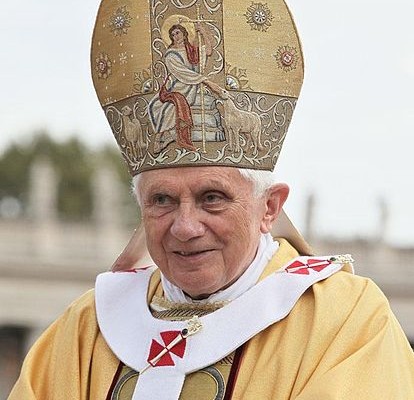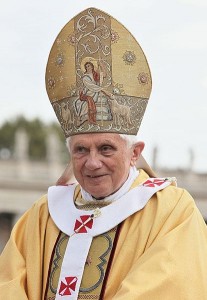Was The Pope Mistaken?

 During his New Year’s Eve address, Pope Benedict XVI criticized capitalism for contributing to tension, war, and instability. [1][2][3][4] As one of the most influential men alive today (Forbes lists him as the #5 most powerful person alive), it would be advantageous to have the Pope’s support. However, it appears that the Pope wishes to instead emulate many of the same scruples and to commit the very fallacies that leftist progressives are often found employing in their attempts to gain an upper hand over the conservative right.
During his New Year’s Eve address, Pope Benedict XVI criticized capitalism for contributing to tension, war, and instability. [1][2][3][4] As one of the most influential men alive today (Forbes lists him as the #5 most powerful person alive), it would be advantageous to have the Pope’s support. However, it appears that the Pope wishes to instead emulate many of the same scruples and to commit the very fallacies that leftist progressives are often found employing in their attempts to gain an upper hand over the conservative right.
This, however, is not the Pope’s first public portrayal of his skepticism. In his book Jesus of Nazareth he says:
“Confronted with the abuse of economic power, with the cruelty of capitalism that degrades man into merchandise, we have begun to see more clearly the dangers of wealth and we understand in a new way what Jesus intended in warning us about wealth.” NBC, 2007
Though disappointing, the Pope’s public skepticism does provide a good representation of the general populace’s standpoint on the issue of capitalism. Nearly 40% of Americans view unregulated capitalism negatively, which means that capitalism is losing the public’s favor. Although we did not really need to be reminded yet again of capitalism’s current situation (because nearly any liberal would be happy to oblige) it does add some punch to hear it from a religious leader who generally maintains a more conservative viewpoint on political issues, e.g. abortion, gay marriage, etc. But, as the Huffington Post stated in their segment on the Pope’s criticisms, this Pope is very much a social conservative and fiscal liberal.
During his homily he stated a couple of arguments against capitalism. He said:
“Although the world is sadly marked by ‘hotbeds of tension and conflict caused by growing instances of inequality between rich and poor, by the prevalence of a selfish and individualistic mindset which also finds expression in an unregulated financial capitalism,’ as well as by various forms of terrorism and crime, I am convinced that ‘the many different efforts at peacemaking which abound in our world testify to mankind’s innate vocation to peace.'” The Vatican, 2013
I must admit that income inequality is indeed increasing. However, the cause of this increase is debatable, as are most things. Free market economies generally have lower levels of income inequality than their counterparts, and it has only recently become evident that inequality has been increasing as it has. Interestingly, America has been consistently downgraded on economic freedom indexes for the last five years. Also, the United States is currently ranked #10 in the world for economic freedom according the the Heritage Foundation.
“Over the two decades prior to the onset of the global economic crisis, real disposable household incomes increased by an average 1.7% a year in OECD countries. In a large majority of them, however, the household incomes of the richest 10% grew faster than those of the poorest 10%, so widening income inequality. Differences in the pace of income growth across household groups were particularly pronounced in some of the English-speaking countries, some Nordic countries, and Israel. In Japan, the real incomes of those at the bottom of the income ladder actually fell compared with the mid-1980s.” – OECD, 2011
While it may be that income inequality is increasing, I ought to point out that income inequality is not inherently bad. Indeed, some levels of inequality are good. It should make sense for the guy who is designing computer programs to make more money than the guy who works at McDonalds and spends most of his time playing video games. Income inequality is an indicator of economic productivity. The more value you are creating for other people, the more income you will have.
Although income inequality has been on the rise in America, it is not due to the free market. Instead, rising income inequality is caused by the decline of the free market. As government spending and regulation increases, winners and losers are made. With bailouts, Obamacare, and increased taxes, it is no wonder that the rich are only getting richer while the poor stagnate.
Income inequality in the free market may be one of the Pope’s complaints, but it is actually not an evil in the eyes of economist. In a genuinely free market, the rich are rich for a reason, and the poor are poor for a reason. When the free market is striving, people like Steve Jobs and Bill Gates flourish while the college students go into debt. This is natural. College students produce nothing for the economy, but they are in the process of learning how, and they thus receive loans. However, it is perfectly right that someone who is putting nothing into the economy will receive nothing back.
What is important is income mobility. Income or class mobility is essentially the relative ease at which you can move up or down the ladder of wealth. In nations with extremely defined class lines, income mobility will be limited. In nations where the free market is left to its own devices, income mobility will be extremely high. People with good ideas in the free market system aren’t hindered by hundreds of applications, visas, permits, and other red-tape before they can implement their plans. Instead, the people who have something to offer others will be most rapidly and efficiently rewarded in the free market.
It was also stated by the Pope that capitalism increases tension and the likelihood of war. The evidence simply does not support this. Why would two nations that are trading, an inherently mutually beneficial activity, want to end a relationship that is creating value for both parties involved?
“The percentage of countries rated as “Free” rises in each quintile as the freedom to exchange with foreigners rises, while the percentage rated as “Not Free” falls. In fact, 17 of the 20 countries rated as “Not Free” are found in the bottom two quintiles of economic openness, and only three in the top three quintiles. The percentage of nations rated as “Partly Free” also drops precipitously in the top two quintiles of economic openness.” Cato, 2007
Additionally:
“Not only does free trade require little military backing, but, moreover, markets should substitute for the military. Replacing military relations with commercial relations would lead to significant tax savings, as well as to more peace. “[B]esides dictating the disuse of warlike establishments, free trade (for of that beneficent doctrine we are speaking) arms its votaries by its own pacific nature, in that eternal truth—the more any nation traffics abroad upon free and honest principles, the less it will be in danger of wars” (emphasis in original). Thus rather than creating antagonistic relationships, trade encourages peaceful relations between nations. Nothing encourages cooperation so much as a mutually advantageous enterprise. Manufacturing, not naval strength, is the key to prosperity.” The Freeman, 2008
The Pope seems to have been mistaken on this one. It just makes no sense for two economies that are both getting what they want and need through trade to simply stop trading in order to go to war. It does occasionally happen, but it isn’t rare to see trade decrease before the start of a war.
The Pope also seemed concerned about the individualist capitalist spirit. I laugh. I cannot recall anywhere in the Bible where Jesus used Roman troops to rob the rich to give to the poor. Instead, charity was commanded to be given through the free market, through voluntary exchange. It is one of the great ironies of the world that riches are best created through individual, free, unregulated action. This confuses the statist, the government lovers. It is, however, the only imaginable way to reach prosperity. The government cannot create wealth, but thankfully individuals excel at it.
Note: This article was updated at 11:33 CST on February 4, 2013 to include sources and direct quotations.
Discussion — One Response